Top 20 Improvements to Add Value to Your Home
.jpg)
At Bebington Glazing, we specialise in the installation of double glazing. This typically includes windows and doors.
The primary reason for investing in double glazing products is to improve the aesthetic look of your property and to improve your home's energy efficiency rating. However, many of our customers upgrade their windows and doors as an investment.
It's surely no secret that better windows and doors increase the value of your home. Further, an improved 'look' this affords often means you can sell your home more quickly. Research indicates you can add around 30% to the value of your home by carrying out improvements.
One of the questions you may have is: 'What other ways am I able to add value to my home?' This is an important question for homeowners looking to sell their property, and a question you should give some serious thought too.
In this post, we list 20 of the best ways you can add value to your home. Many of these improve won't break the bank! But some will.
Updating old content
Furthermore, the internet is cluttered with outdated posts on this subject:
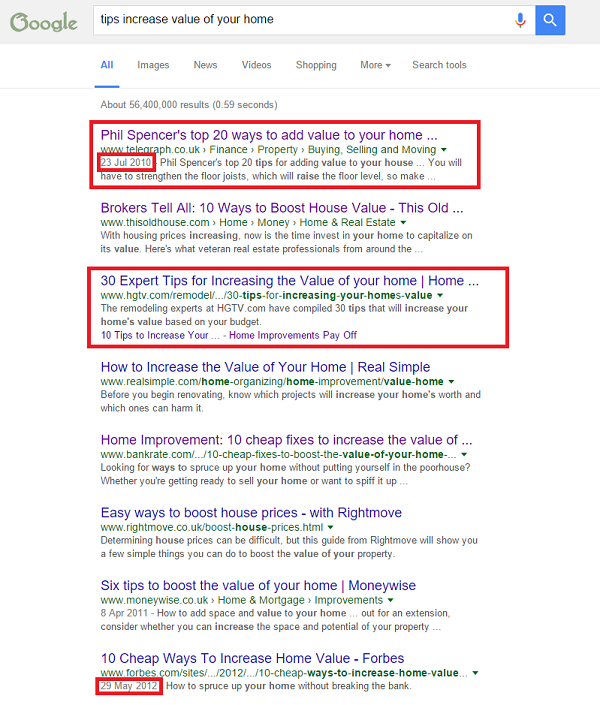
Therefore, we aim to update these posts for 2016.

What you will learn in this post
- Build a conservatory. Doing so adds around £10,000 to the value of your home.
- Improve your garden. Doing so improves the vital 'first impression' you generate in the minds' of prospective buyers.
- Invest in an extension. Doing so may add around £20,000-£40,000 to the value of your home.
- Replace your roof. Doing so may add around £2,000 to the value of your home (even when you take into account the cost of replacing the roof!).
- Invest in new carpets. Doing so may improve your home's first impression in the mind of buyers and add around £3,000 to the value of your home.
- Invest in a loft conversion. Doing so may slap on an additional 15% to the value of your home.
- Invest in a new kitchen. Doing so may add a further £5,000 to the value of your home.
- Invest in a new bathroom. Doing so may add a further £3,000 to the value of your home.
- Fit a new central heating system. Doing so may add a further £7,000 to the value of your home (even after you take into account the cost of replacing your central heating system).
- Install a basement. This tip is controversial - see below for more details.
- Convert an adjoining garage into a new room. This may add a further £5,000 (net value after conversion costs) to the value of your home.
- Investment in new double glazed windows. This may add a further £5,000 (net value after conversion costs) to the value of your home.
- Knock down walls. Doing so will make your home appear bigger and help speed up the sales process.
- Invest in a patio door. Doing so will bring your garden closer to your home and help speed up the sales process (as long as point #2 is followed!).
- Invest in decking. Doing so could add a further £2,000-£5,000 to the value of your home.
- Apply for planning permission for an extension. Doing so could add a further £5000-£10,000 to the value of your home.
- Invest in wall insulation. Doing so will remove a powerful bargaining chip from the buyer's arsenal when he or she comes to negotiate the sale price of your home.
- Declutter. Doing so will increase the perceived value of your home and also speed up the sales process.
- Paint walls a neutral white. Again, doing so will increase the perceived value of your home and also speed up the sales process.
- Install air-conditioning. This tip is more applicable for people living in hot countries. See below for more details.
Without further ado, I now present all top #20 tips that help you add value to your property:
.jpg) #1. Build a conservatory
#1. Build a conservatory
A conservatory adds room to your home. This obviously adds value to your home.
Adding a conservatory also breathes life into rooms that were before unused, such as a dining room.
However, adding a conservatory does mean compromising on garden space.
The major advantage of choosing a conservatory over an extension is that the former does not fall under the remit of the building regulations.
The average of cost of building a conservatory is £5000.
This typically adds £10,000 on to the value of your home.
You thus achieve a 100% profit margin.
Not bad at all!
Click here to read the Government's official guidance on conservatories.
PRO TIP: Around a fourth of all home improvements result in a negative return on investment. This is largely do to poor planning and poor budget control. Therefore, we urge you to viciously plan for additional and unexpected costs. Always agree quotes with builders and other tradesmen before work is completed.
 #2. Improve your garden
#2. Improve your garden
It may come as a surprise that improving your garden adds value to your home.
And when we say 'garden', we particularly mean your front garden.
This is because the front garden contributes to the all-important first impression that buyers get when they visit your property.
And the problem with first impressions is that you only get one opportunity to make them.
So ensure the buyer gets a good first impression of your home by making sure your front garden is in immaculate shape.
This means mowing the lawn and clearing up weeds and dead plants.
Many properties will require a professional gardener and/or a landscaper in order to add tangible value to their home.
The average cost of this endeavour is around £8000.
However, this may add up to £16000 to the value of your home. This equates to a 100% return on investment.
And let's not forget that a nice front garden may also speed up the amount of time it takes to sell your home.
.jpg) #3. Invest in an extension
#3. Invest in an extension
Ok, so adding an extension may be outside the price range of most.
But if you can afford the outlay, building an extension typically results in a profit on your investment when you come to sell your property.
The average price of an extension in 2016 is £20,000.
But this could result in a £40,000 increase on the value of your home.
The equates to a 100% profit margin.
A figure not to be ignored!
In May of 2016, the Government is set to relax the rules governing extensions. You will be permitted to add a single-floor extension up to 6 metres in depth for a semi-detached home and 8 metres in depth for a detached home without seeking planning permission.
Click here for a more in-depth look at the rules around extensions.
.jpg) #4. Invest in a new or refurbished roof
#4. Invest in a new or refurbished roof
If your roof is more than twenty years old, then diligent buyers are surely going to ask for a reduction to your asking price in order to replace the aging roof.
Avoid this situation by replacing the roof yourself.
Not only will this weaken the buyer's negotiation position, it will also add value to your home.
And improve the value over and above the price of installing the new roof.
The average cost of a new roof is £5,000.
However, this may increase the value of your property by as much as £7,000.
This equates to a 40% return on investment!
 #5. Invest in new carpets
#5. Invest in new carpets
If your carpets are worn, you may put off prospective buyers.
This is related to point #2 above.
Poor carpets result in a poor first impression.
This in turn lowers the perceived value of your home, and may increase the amount of time it takes to sell your home.
The average cost of re-carpeting your home is £3,000.
However, this may add £6,000 to the value of your home.
This equates to a 100% return on investment.
PRO TIP: If you cannot afford to invest in new carpets, then we urge you to hire a quality carpet cleaner and vacuum.
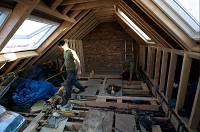 #6. Invest in a loft conversion
#6. Invest in a loft conversion
Many of our customers report that converting their loft into a liveable space increased the value of their home by as much as 15%.
Converting a loft has a similar effect to installing a conservatory or extension i.e. more space becomes available.
However, unlike installing a conservatory or extension, converting a loft does not mean you compromise on garden space.
And to make things even sweeter, regulations generally do not apply to loft conversion due to Permitted Development Rights.
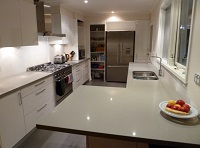 #7. Invest in a new kitchen
#7. Invest in a new kitchen
This point is similar to #2 and #5 above.
Put bluntly, an outdated kitchen will result in a poor first impression with prospective buyers.
A new kitchen may cost you £10,000, but this could result in an additional £15,000 to the value of your home.
This represents a 50% return on investment.
As a rule of thumb, a new kitchen adds 5% to the value of your home.
So if your home is worth £150,000, spend no more than £750 on a new kitchen.
If your home is worth £1,000,0000, spend no more than £50,000 on a new kitchen.
PRO TIP: The cost of your new kitchen should correlate to the value of your home. If your home is worth £150,000, then it makes no sense spending £15,000 on a new kitchen. You will not see a positive return on investment. Work out the percentage increase a new kitchen is likely to add the value of your home.
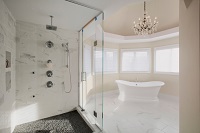 #8. Invest in a new bathroom
#8. Invest in a new bathroom
An outdated bathroom is sure to put off prospective buyers.
Instead, install a new bathroom so buyers are rushing to sign the contract of sale!
A new bathroom may cost £5,000, but this could add around £7,000 on to the value of your home.
This represents a 40% return on investment.
 #9. Fitting a new boiler/central heating
#9. Fitting a new boiler/central heating
An old boiler is likely to fail.
And buyers know this.
This is why many buyers insist on a gas/boiler survey before the contract of sale is signed.
If you have heard of caveat emptor then you really could not blame buyers for insisting on this level of due-diligence.
The average cost of a new central heating system is £6,000.
However, this investment may increase the value of your home by as much as £7,000.
This represents a 16% return on investment.
 #10. Install a basement
#10. Install a basement
A basement is legally viewed as an extension.
The majority of UK homes are not built with a basement.
And digging up the ground to create one is expensive.
Expect to pay around £350 per square foot to install your new basement.
This means your property must be worth more than £350 per square foot in order for you to realise a positive return on investment.
Furthermore, unlike other forms of extensions, a basement will alter the structural load of your property.
This may increase your house insurance and require the assistance of specialists.
We would only recommend you install a basement if you intend to remain in your home and get the benefit of it.
Otherwise, skip this tip!
 #11. Convert your garage into a room
#11. Convert your garage into a room
Converting a garage into living space is sure to add value to your home.
This is because most prospective buyers place a premium on extra living space over and above the value placed on garage storage space.
Converting a garage into living space could cost around £10,000.
However, this could well add £15,000 to the value of your home.
The represents a 50% return on investment.
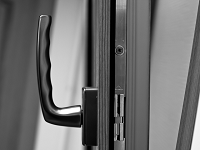 #12. Investment in new double glazed windows
#12. Investment in new double glazed windows
This point is related to points #2 and #5 and #7 above.
Installing new windows will surely improve the first impression your home receives from prospective buyers.
New windows also improve your homes energy ratings.
New windows could cost up to £10,000.
But this could result in an £15,000 increase in the value of your home.
This represents a 50% return on investment.
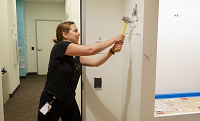 #13. Knock down non-essential walls
#13. Knock down non-essential walls
Knocking down non-load-bearing walls makes your home appear bigger.
This positive perception may add value to your home.
However, it's difficult to say how much value this will add to your home.
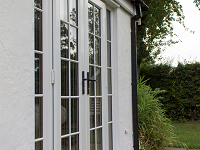 #14. Invest in a glass patio door
#14. Invest in a glass patio door
A patio door highlights the positive features of your garden.
This may increase the value of your property, since it will likely improve the perceived value of your home.
This tips is linked to #2 above.
If your garden is messy, patio doors may decrease the value of your home.
Therefore, only follow this point if your garden is in tip-top condition.
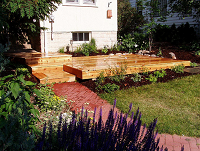 #15. Invest in decking
#15. Invest in decking
We recommend you install outside decking that is adjacent to your patio doors.
Decking improves the perceived value of your home's outdoor living space.
This makes your rear garden seem more appealing.
If you're handy with DIY, then install the decking yourself. This will substantially decrease the cost of decking and therefore improve your return on investment.
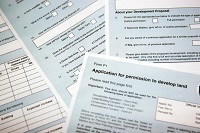 #16. Apply for planning permission for an extension
#16. Apply for planning permission for an extension
This tip adds value to your home without the expense of actually building an extension.
If you market your property with permission to build an extension, you will surely increase the value of your home.
This is because planning permission for an extension is not always attainable due to neighbourhood objections.
If you relieve your buyer of the hassle of applying for planning permission, he or she will usually reward you for your efforts by paying a premium for your home.
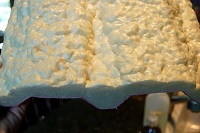 #17. Invest in wall insulation
#17. Invest in wall insulation
In 2016, having cavity wall insulation is non-negotiable.
A lack of cavity wall insulation will surely be raised in the buyer's survey.
This will afford the buyer a powerful negotiation chip when it comes to reducing your asking price.
Deprive buyers of this chip by installing cavity wall insulation yourself.
Invest in a thermal leak detector for around £28. This will reveal gaps in your home that are leaking out heat.
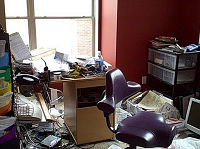 #18. Declutter
#18. Declutter
This tip may sound condescending and an insult to your intelligence, but you would be surprised by the number of homeowners who fail to sell their homes due to cluttering.
Clutter will surely give prospective buyers a poor first impression upon viewings.
Clutter may neutralise other improvements you've made.
You may rationalise that clutter is not structural and so does not affect the value of your home.
However, value is often more about subjective perception as it is tangible quality.
It's thus essential that you take steps to declutter your home.
Follow the old adage of less is more.
Invest in quality storage units if necessary. This may mean a trip down to your local IDEA or purchasing a storage unit from the Internet.
 #19. Paint walls a neutral white
#19. Paint walls a neutral white
We urge you to remove wallpaper and instead paint your walls a neutral white.
Freshly painted walls are unlikely to put off prospective buyers.
And freshly paint walls will lift up an otherwise tired looking room.
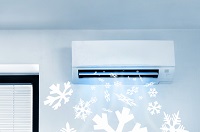 #20. Install air-conditioning
#20. Install air-conditioning
This tip applies mostly to homeowners located outside of the United Kingdom and particularly in countries that experience hot summers.
Installing an air-conditioning unit will surely improve your home's estimation in the mind of potential buyers, particularly in hot countries.
If you invest in an air-conditioning unit, we urge you to invest in a centralised system due to a superior energy-efficiency rating (EER) these units have over localised units.
That's all for today!
I hope you enjoyed my post on top tips to increase your home's value.
Be sure to share this post on social channels using the buttons below.
And be sure to follow us on Twitter: @Beb_Glazing
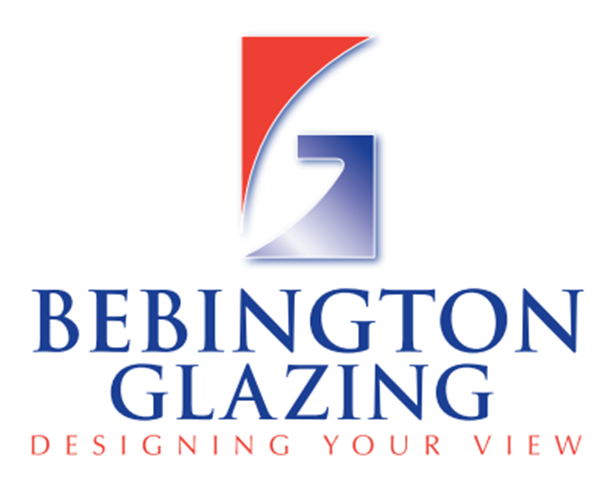
Comments
No Comments
Add a comment